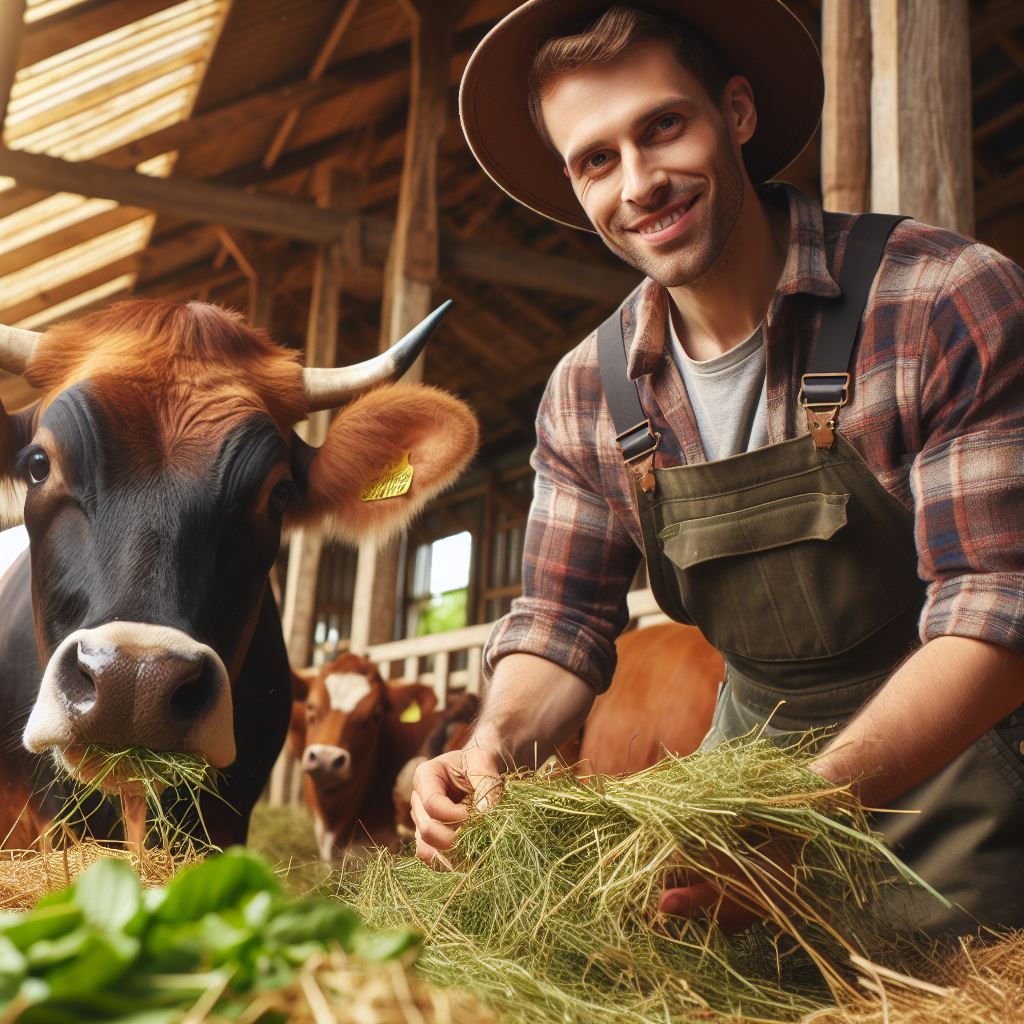Introduction
Let’s explore Ethical Livestock Breeding Tips.
Importance of ethical livestock breeding
Ethical livestock breeding is crucial for promoting animal welfare, sustainability, and ensuring food safety for consumers.
Breeding practices that prioritize the welfare of animals contribute to their overall health and well-being.
By breeding animals ethically, we can ensure that they are not subjected to unnecessary suffering or harm.
Ethical breeding also plays a vital role in maintaining the genetic diversity of livestock populations.
Preserving genetic diversity safeguards against the risk of diseases and enhances the resilience of livestock.
Furthermore, ethical breeding ensures the production of high-quality meat, dairy, and other animal products.
Animals that have been bred ethically are less likely to have health issues that may affect the safety of the products.
Consumers value and appreciate the efforts made by breeders to prioritize ethics in their practices.
Ethical livestock breeding can also improve the reputation and marketability of farms and businesses.
By adhering to ethical standards, breeders can gain consumer trust and maintain a sustainable and profitable operation.
Generally, ethical livestock breeding is essential for animal welfare, sustainability, and high-quality products.
Breeding practices that prioritize ethics contribute to the overall well-being of animals and the success of breeders.
Selecting the Right Breeding Stock
When it comes to ethical livestock breeding, selecting the right breeding stock is crucial.
By researching reputable breeders, understanding genetic traits and health history, and assessing the temperament and behavior of potential breeding stock, you can ensure that you are making responsible and ethical choices for the future of your livestock.
Transform Your Agribusiness
Unlock your farm's potential with expert advice tailored to your needs. Get actionable steps that drive real results.
Get StartedResearching reputable breeders
Before purchasing any breeding stock, it is essential to research and find reputable breeders.
Reputable breeders have a good track record and are known for their ethical breeding practices.
Here are some tips to help you find reputable breeders:
- Look for breeders who have been in the industry for a significant amount of time.
- Ask for recommendations from other livestock breeders or local agricultural organizations.
- Visit livestock shows and exhibitions where you can meet and interact with different breeders.
- Read online reviews and testimonials from other customers who have purchased animals from the breeder.
By following these steps, you can ensure that you are purchasing breeding stock from a reputable breeder who prioritizes the well-being of their animals.
Understanding genetic traits and health history
Another crucial aspect of selecting the right breeding stock is understanding their genetic traits and health history.
Here are some tips to help you make informed decisions:
- Ask the breeder for detailed information about the lineage of the animals, including any notable champions or successful offspring.
- Inquire about any prevalent genetic diseases or health issues within the bloodline.
- Request access to health records and veterinary documentation for the potential breeding stock.
- Consider genetic testing to identify any hidden genetic conditions that may be present.
By gaining a deeper understanding of the genetic traits and health history of the breeding stock, you can make informed decisions and avoid potential health issues in future generations.
Assessing temperament and behavior of potential breeding stock
Aside from genetics and health, assessing the temperament and behavior of potential breeding stock is vital for ethical livestock breeding.
Here are some factors to consider:
- Observe how the animals interact with humans, including their response to handling and socialization.
- Assess their behavior in the presence of other animals to determine if they display any aggression or dominance.
- Consider the desired temperament for the breeding program, whether it’s calm and docile or energetic and active.
- Take note of any behavioral issues or red flags that may affect the welfare and suitability of the animals as breeding stock.
By evaluating the temperament and behavior of potential breeding stock, you can ensure that they possess the desired traits for the future generation while promoting the overall well-being of the animals.
Most importantly, selecting the right breeding stock is a critical step in ethical livestock breeding.
By researching reputable breeders, understanding genetic traits and health history, and assessing the temperament and behavior of potential breeding stock, you can make responsible choices that prioritize the welfare of the animals and the success of your breeding program.
Read: Top Feeding Tips for Healthy Sheep
Providing Proper Nutrition and Care
Ensuring a balanced diet for breeding animals
- Include a variety of essential nutrients such as proteins, carbohydrates, vitamins, and minerals.
- Avoid overfeeding or underfeeding, as it can lead to health problems and reproductive issues.
- Consult with a professional nutritionist to develop a customized diet plan based on individual breed requirements.
- Monitor and adjust the feed according to the animal’s growth stage, reproductive phase, and overall health condition.
- Regularly analyze the nutritional content of the feed and make necessary adjustments to maintain a balanced diet.
- Provide clean and fresh water at all times, as it plays a crucial role in digestion and overall well-being.
- Ensure access to appropriate grazing and forage resources to mimic the natural feeding behavior of the animals.
- Consider supplementing the diet with minerals or vitamins if deficiencies are identified through veterinary guidance.
- Implement a feeding routine that allows for regular meal times and minimizes stress or aggression among breeding animals.
Regular veterinary check-ups and vaccinations
- Schedule regular visits with a qualified veterinarian to assess the overall health and reproductive condition of the animals.
- Follow the recommended vaccination schedules to protect breeding animals against common diseases.
- Keep accurate and up-to-date records of vaccinations, medical treatments, and any reproductive interventions.
- Discuss reproductive management techniques with the veterinarian to ensure optimal breeding success.
- Perform routine health checks to detect and treat any potential health issues early on.
- Seek veterinary advice promptly if any signs of illness, abnormal behavior, or reproductive difficulties occur.
- Adhere to biosecurity measures to prevent the introduction and spread of contagious diseases among breeding animals.
- Always use approved veterinary products and medications following proper dosage instructions.
Proper housing and living conditions
- Create a clean and well-maintained environment that promotes the health and well-being of breeding animals.
- Ensure adequate space for each animal, taking into account their size, breed, and reproductive needs.
- Provide proper ventilation to reduce the risk of respiratory issues and maintain optimal air quality.
- Implement appropriate temperature control measures to prevent heat stress or cold exposure.
- Install suitable flooring materials that are comfortable, non-slippery, and easy to clean.
- Ensure the availability of adequate bedding materials to provide warmth, comfort, and hygiene.
- Design and maintain separate housing facilities for pregnant, nursing, and weaning animals.
- Implement effective pest control measures to prevent infestations and minimize stress on breeding animals.
- Regularly inspect and maintain all housing structures, fences, and equipment to avoid injuries and accidents.
By prioritizing proper nutrition, regular veterinary care, and suitable living conditions, ethical livestock breeding can be achieved.
A holistic approach to animal welfare ensures the overall health and reproductive success of breeding animals.
Read: Goat Nutrition: What Your Herd Needs
Promoting Natural Breeding Practices
Encouraging natural mating
- Allowing livestock to engage in natural mating promotes healthy breeding practices.
- Natural mating ensures genetic diversity and prevents inbreeding within the livestock population.
- Providing a suitable environment for natural mating encourages the animals to display their natural courtship behaviors.
- Proper nutrition and management practices support the animals’ overall reproductive health and increase natural mating success.
- Observing the animals closely during mating ensures that it is consensual and reduces the risk of aggressive behavior.
Avoiding artificial insemination unless necessary
- Artificial insemination should only be used when natural mating is not possible or has failed.
- Artificial insemination can be helpful in cases where genetic improvement or disease control is crucial.
- However, relying too heavily on artificial insemination can lead to the loss of natural breeding instincts and behaviors.
- It is essential to maintain a balance between natural mating and artificial insemination to uphold ethical breeding practices.
- Regularly assessing the need for artificial insemination minimizes unnecessary intervention in the breeding process.
Allowing for natural gestation periods
- Allowing for natural gestation periods allows the developing fetus to mature properly.
- Shortening gestation periods through hormonal manipulation or other means can harm both the mother and offspring.
- Providing suitable maternity accommodations during gestation ensures the well-being of the pregnant livestock.
- Adequate space, proper nutrition, and veterinary care during gestation contribute to the welfare of the pregnant animals.
- Allowing natural gestation periods respects the animals’ physiological needs and promotes ethical breeding practices.
Overall, promoting natural breeding practices is essential for ethical livestock breeding.
Encouraging natural mating allows for genetic diversity and prevents inbreeding.
Artificial insemination should only be used when necessary, maintaining a balance with natural mating.
Allowing for natural gestation periods ensures the well-being of the pregnant animals and their offspring.
By following these practices, breeders can uphold ethical standards and promote the overall welfare of the livestock population.
Read: From Farm to Table: Poultry Processing Insights
Monitoring Breeding Cycles and Family Lines
Tracking estrus cycles and ovulation
Regularly observe the behavior and physical signs of female animals to identify their estrus cycles and ovulation.
Take note of increased vocalization, mounting behavior, presence of mucus discharge, and swollen vulva in females.
Showcase Your Farming Business
Publish your professional farming services profile on our blog for a one-time fee of $200 and reach a dedicated audience of farmers and agribusiness owners.
Publish Your ProfileUse an estrus detection device or a calendar to keep track of the breeding cycle for each individual animal.
Consult a veterinarian or experienced livestock breeder to learn more about specific signs relating to different species.
Monitor the herd closely during the breeding season to ensure accurate detection and successful breeding.
Avoiding inbreeding and maintaining genetic diversity
Familiarize yourself with the concept of inbreeding depression, which can lead to reduced fertility and increased health problems.
Keep detailed records of each animal’s lineage to identify potential relatives and prevent accidental inbreeding.
Avoid mating animals that are closely related, such as parent-offspring or sibling-sibling pairs.
Consider outcrossing, which involves breeding animals from different but complementary bloodlines to maintain genetic diversity.
Seek advice from breed associations or genetic experts to develop a strategic breeding plan that promotes genetic variation.
Recording pedigree information for future reference
Create a comprehensive database that includes pedigree information for all breeding animals.
Record the name, registration number, birthdate, and lineage of each animal.
Regularly update the database with relevant information such as breeding outcomes, offspring performance, and health records.
Use identification methods, such as ear tags or tattoos, to easily link an animal to its pedigree information.
Utilize software or online platforms designed for pedigree management to simplify record-keeping and improve accessibility.
Review the pedigree information regularly to identify any potential issues and make informed decisions regarding future breeding.
Share pedigree information with potential buyers or collaborators to demonstrate the quality and breeding history of your livestock.
In general, monitoring breeding cycles and family lines is crucial for ethical livestock breeding.
By tracking estrus cycles and ovulation, avoiding inbreeding, and recording pedigree information, breeders can ensure the health and genetic diversity of their herds.
It is essential to stay vigilant, seek expert advice, and maintain accurate records to promote responsible and sustainable livestock breeding practices.
Read: Shearing Techniques for Sheep: A Guide

Ethical Considerations during Pregnancy and Birth
It is crucial to adopt ethical practices during the process of livestock breeding to ensure the well-being of the animals involved.
This section will discuss various considerations that need to be addressed during pregnancy and birth.
Providing adequate prenatal care
- Regular veterinary check-ups should be scheduled to monitor the pregnant livestock’s health.
- Nutritious diets tailored to the specific needs of the pregnant animals should be provided.
- Ensuring access to clean water and maintaining suitable living conditions is essential.
- Implementing vaccination protocols to prevent diseases and infections is a responsible practice.
- Monitoring weight gain and ensuring proper exercise helps maintain the overall health of the pregnant livestock.
Promoting natural birthing processes
- Allowing natural mating instead of using artificial insemination respects the animal’s natural instincts.
- Giving livestock adequate space and privacy during labor helps reduce stress and discomfort.
- Providing clean and comfortable birthing areas with suitable bedding materials promotes a safe and calm environment.
- Allowing the birthing process to occur naturally without unnecessary interventions respects the animal’s autonomy.
- Appropriate assistance should be provided only if complications arise during the birthing process.
Ensuring proper postpartum care
- Separating the newborn from the mother immediately after birth should be avoided whenever possible.
- Providing the newborn with colostrum, the first milk rich in antibodies, is crucial for its immunity.
- Monitoring the overall health and behavior of both the mother and the newborn is essential during the postpartum period.
- Ensuring proper nutrition and a stress-free environment for the mother helps with her recovery.
- Providing a clean and suitable environment for the newborn promotes its growth and overall well-being.
By following these ethical considerations during pregnancy and birth, livestock breeders can ensure the health and welfare of their animals.
Prioritizing prenatal care, promoting natural birthing processes, and providing proper postpartum care are essential aspects of ethical livestock breeding.
See Related Content: Top Breeds for Profitable Pig Farming
Responsible Placement of Offspring
Assessing potential homes or buyers
It is crucial to carefully evaluate potential homes or buyers for our livestock offspring.
We must prioritize the welfare of our animals and ensure they will be properly cared for.
Conduct thorough background checks and ask for references to ensure the buyer’s credibility.
Visit the buyer’s premises to assess the conditions and environment their animals live in.
Look for signs of responsible pet ownership, such as proper housing, feeding, and healthcare.
Inquire about the buyer’s experience and knowledge in raising and caring for livestock animals.
Evaluate the buyer’s commitment and dedication to providing a suitable life for the offspring.
Avoiding improper sales practices (e.g., pet stores, auctions)
Selling livestock offspring through pet stores or auctions can lead to unethical practices.
Pet stores often prioritize profit over animal welfare and may not vet potential buyers.
Auctions attract impulse buyers who may not have appropriate knowledge or facilities for the animals.
Instead, consider selling directly to responsible individuals who show genuine interest and commitment.
Establish a network of fellow breeders or enthusiasts who can help connect you with suitable buyers.
Advertise responsibly and make it clear that only serious inquiries from knowledgeable buyers are welcome.
Prioritize the long-term well-being of the animals over making a quick sale.
Educating buyers on responsible pet ownership and welfare
It is our responsibility to educate buyers on proper livestock ownership and welfare practices.
Provide detailed care instructions, including feeding, housing, healthcare, and exercise requirements.
Showcase Your Farming Business
Publish your professional farming services profile on our blog for a one-time fee of $200 and reach a dedicated audience of farmers and agribusiness owners.
Publish Your ProfileEducate buyers about the specific needs, behavior, and temperament of the livestock breed.
Emphasize the importance of regular veterinary check-ups, vaccinations, and preventive treatments.
Educate buyers about the legal requirements and regulations regarding livestock ownership.
Offer ongoing support and guidance, making yourself available to answer any questions or concerns.
Provide resources such as books, websites, or local support groups to further educate the buyers.
In the end, responsible placement of livestock offspring is essential for ensuring their well-being.
Assessing potential homes or buyers, avoiding improper sales practices, and educating buyers are key aspects of ethical livestock breeding.
By prioritizing the welfare of our animals, we can contribute to a more compassionate and responsible livestock breeding industry.
Breed Preservation and Conservation Efforts
Supporting endangered or rare breeds
- Research and identify endangered or rare livestock breeds in your area.
- Make a conscious decision to support these breeds by including them in your breeding practices.
- Connect with local farmers or breeders who are actively working to preserve these breeds.
- Purchase breeding stock from these farmers to contribute to the conservation efforts.
- Educate yourself and others about the unique characteristics and benefits of these breeds.
Collaborating with breed-specific organizations
- Identify and join breed-specific organizations that focus on the preservation and promotion of specific breeds.
- Attend conferences, workshops, and seminars organized by these organizations to gain knowledge and network with other breeders.
- Participate in breed shows and exhibitions organized by these organizations to showcase your livestock and raise awareness about the breed.
- Contribute to breed-specific publications, blogs, and newsletters to share your experiences and insights with a larger audience.
- Engage in discussions and forums provided by these organizations to learn from the experiences of other breeders.
Participating in breed conservation programs
- Collaborate with government agencies, universities, and research institutions that run breed conservation programs.
- Offer your livestock as part of research projects aimed at studying and preserving specific breeds.
- Contribute financially or volunteer your time and skills to support ongoing conservation programs.
- Participate in breed surveys and data collection initiatives to provide valuable information for conservation efforts.
- Play an active role in lobbying for government policies and regulations that promote and protect rare breeds.
Overall, breed preservation and conservation efforts are crucial in maintaining the diversity and genetic integrity of livestock.
By supporting endangered or rare breeds, collaborating with breed-specific organizations, and participating in breed conservation programs, breeders can contribute to the long-term sustainability of these valuable genetic resources.
Conclusion
Ethical breeding fosters animal welfare, ensuring a humane and sustainable approach to livestock management.
Prioritizing genetic diversity safeguards against inbreeding, promoting resilient and healthy animal populations.
Responsible breeding practices contribute to the overall well-being of animals, aligning with ethical and moral standards.
The bond between ethical breeding and environmental sustainability creates a harmonious coexistence between agriculture and nature.
The consumer demand for ethically produced livestock products underscores the economic viability of conscientious breeding practices.
Continuous education and awareness play a pivotal role in shaping a future where ethical considerations guide every breeding decision.
Embracing transparency in breeding processes builds trust among consumers, establishing ethical breeding as a cornerstone of agriculture.
Collaboration among breeders, researchers, and policymakers is essential for developing and implementing ethical breeding standards.
As ethical breeding gains prominence, it becomes a catalyst for positive change, driving improvements across the entire livestock industry.
Therefore, the journey towards ethical livestock breeding is an ongoing commitment to better practices, emphasizing compassion, sustainability, and excellence.




